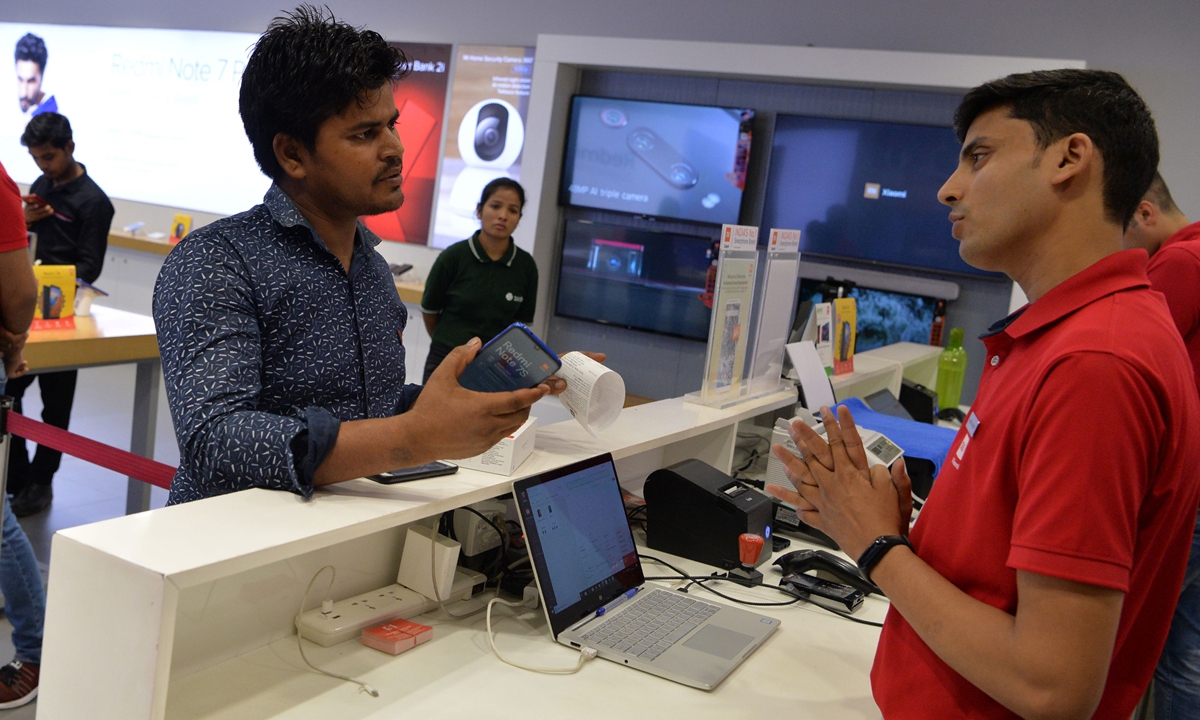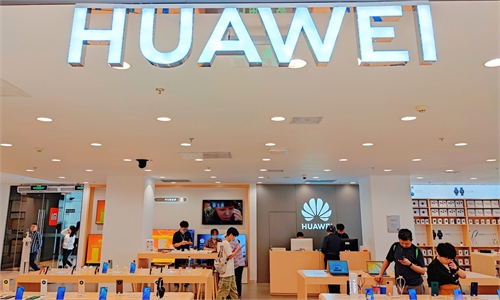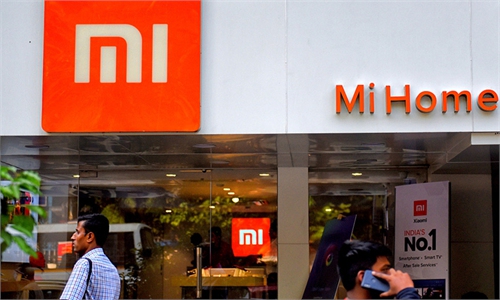India's reported plan to ban certain Chinese smartphones 'politically charged': industry insider
Politically charged move won't lift its backward industry: insider

In this photo taken on August 20, 2019, a salesman speaks with a customer after he purchased a new smartphone made by Xiaomi at a Mi store in Gurgaon, India. Photo: VCG
China's Foreign Ministry on Tuesday urged the Indian government to provide a fair and nondiscriminatory environment for Chinese firms, after reports of India mulling a ban on Chinese smartphone makers' sale of cheaper devices in India, a move Chinese experts say is politically charged and against market rules.
The Indian government seeks to restrict Chinese companies from selling smartphones cheaper than 12,000 rupees ($150) in the country to "[kick start] its faltering domestic industry," Bloomberg reported on Monday, citing sources familiar with the matter.
Chinese brands such as Xiaomi, Realme and Transsion could be affected by such a ban, the report said.
Asked about reports of the Indian move at a regular press briefing on Tuesday, Chinese Foreign Ministry spokesperson Wang Wenbin said that China urges the Indian government to honor its commitment on openness and cooperation and offer a fair, open and nondiscriminatory business environment for Chinese investors.
"China will firmly support Chinese companies in safeguarding their legitimate rights and interests," Wang said.
Chinese experts said that such a move, if taken, would be a blatant breach of market rules on fair competition, and would do little to help bolster India's backward phone manufacturing industry.
A Chinese executive based in India told the Global Times on condition of anonymity that the low-end spectrum of the market has 380 million users in India, given the country's status as the next "billion person" market.
"The politically charged move is [considered] a double win for the Indian government," the executive said. "Bashing China can score several political points among Indian voters, and cutting its reliance on China almost serves as a pledge to the US and the EU about its determination to decouple from China in terms of supply chains."
The Indian government has been trying to bolster the domestic smartphone industry and some Indian companies have plans to fill that role. For example, the JioPhone, produced by Indian billionaire Mukesh Ambani in partnership with Google, is one of the most affordable smartphones on the market.
South Korea's Samsung is the only brand among the top six best-sellers in India that isn't from China.
Xiaomi's smartphone sales could decrease by 4-5 percent, Bloomberg reported, citing an estimate.
Xiaomi and Realme declined to comment. Oppo did not respond to an interview request as of press time.
Smartphones under $150 represent a segment that Chinese companies can make money from, but the fortunes of most Chinese smartphone firms are tied to costlier models, a position still unassailable to the Indian government, the executive said.
"So the new move mentioned in the report, if real, would inflict more insults than actual damage to Chinese smartphone brands operating in India," the person said, adding that the affordable segment is gradually being abandoned by Chinese brands due to its thin margins.
India's move to squeeze out Chinese companies by every means would lead to a big setback in the economic and trade relationship between India and China, a Chinese international affairs expert surnamed Zhao told the Global Times on Tuesday.
Zhao added that recent moves targeting Chinese smartphone makers were aimed at forcing those firms out using artificial barriers, which is against the rules of the market economy.
The executive also said that the Indian government's continuous assaults on Chinese companies over what it claimed was tax evasion since 2021 were "more troublesome."
"Still, it's a lesson on how the Indian government is treating foreign investors," the executive said. "[India] is forgetting the common sense that an underdeveloped country needs foreign investors and their advanced technology to develop," the executive said.
Chinese smartphone brands are steadily scaling up the value chain. Even Transsion, the brand famous for its affordable devices that dominate the African market and many South Asian markets, said that its 2021 revenue for smartphones was six times that of feature phones.
India has stepped up crackdown on Chinese firms in recent years. It has since banished more than Chinese 300 apps, including Tencent's WeChat and ByteDance's TikTok.
Meanwhile, the Indian government has been hoping to take over some production of mobile devices amid global supply chain relocations, anti-globalization headwinds and the changing geopolitical landscape.
Apple supply chain analyst Kuo Ming-chi predicted that India will began to ship the latest iPhone 14 in sync with China, for the first time, in the second half of 2022. Previously, India was usually one quarter or more behind China.
However, India's reputation as a worthy alternative to China received a mortal blow in December 2020, when Indian workers vandalized a factory owned by Wistron Corp, destroying equipment and vehicles, causing damage of around $60 million. Worker protests also affected Apple supplier Foxconn's plant near Chennai in southern India in 2021.
Despite its ill-intended moves against Chinese smartphone makers, it remains questionable if India can lift its own cellphone industry, Zhao said.




